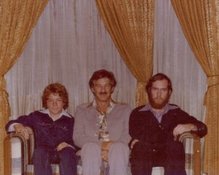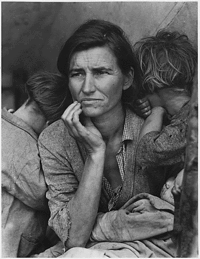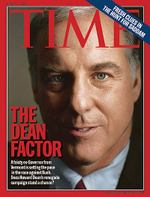
One of my continuing disagreements with the liberal blogosphere involves who we blame for the ridiculousness of our time.
There is no end of culprits. The stupidity of George W. Bush. The evil of Dick Cheney. A vast right-wingl conspiracy. The ignorance of our so-called "serious" analysts. A long-running plot by the Bush family going back generations.
In a way such theories are comforting. They absolve us from blame or participation in the bad things happening all around us. We can see ourselves as helpless, frightened children, which gives us permission to indulge in childish temper tantrums.
I want to call bullshit on this.
As regular readers here know, I ascribe what is happening in our
time to history.
To many that’s a high-falutin term, but it really
means the lessons you have learned in life, the lessons you were taught
by your parents, and the lessons they were taught by their parents. We
mix all these things into a personal legend, a personal myth with
values, a personal history which we use to explain, justify, or fight
against events. Combine all those personal legends and you get the
national myth, what we believe to be our national story, with its own
values, and its own requirements for the use of power.
In many of the pieces I’ve written here on this subject, I have gone
into my own personal history. I have discussed the conservatism of my
teen-age years. I have discussed the lessons of my father. When you’re
thinking about current events, I bet you do the same. You reflect on
what has happened in your own life, what your parents taught you, and
the legends of your grandparents.
That’s really all history is. The word story is at the heart of it.
History changes with every generation, as we attempt to make sense of
the past in terms of the future.
Our collective memory of history is mainly determined by great crises we have witnessed. When someone says "9-11 changed everything"
they are reacting to that one specific event, making the heart of their
personal history the focus for their thoughts about what we should do
tomorrow-and-tomorrow.
In my own work here I have looked at the largest political
convulsions in American history, and 9-11 is not one of them. Just as
the Cuban Missile Crisis is not one of them, or the rise and fall of
Joe McCarthy. These were seminal events, but they were, in the end,
events. A generation-changing crisis consists of a long series of
convulsive events, a shared experience over many years, which causes
people to fundamentally change their view of the world.
America is lucky. We are a democracy so what our people think
counts. We are relatively autonomous — separated by water from all our
enemies — so our internal political clock is what counts. This isn’t
true for other nations. American intervention re-set the political
clocks of most people around the world. Many of the views held around
the world are based on America’s behavior toward them, in many cases
behavior Americans may be dimly aware of. The Iran-Contra war did not
re-set America’s political clock, but it re-set the clock of Central
America. The same is true for World War II — for us it mainly
validated assumptions dating back to 1933, where elsewhere it was a
final midnight and the world is defined by that bright line between
what came before and what came after, as with the dinosaur extinction.
The last convulsion similar to what Americans are now going through was
called the 60s. It began with John F. Kennedy and ended with Richard
Nixon. The lesson it taught most Americans was that conflict was
necessary, that enemies are everywhere, and that such enemies must be
confronted for America to survive.
The previous convulsion came with the Great Depression, which began
with Herbert Hoover and ended with Franklin D. Roosevelt. Its lesson
was quite different. We must work together, we must believe in our
innate goodness, we must never give up hope, struggling today so tomorrow
might be better.
The earlier convulsion made the sacrifices of World War II not only
possible but palatable. It allowed the Greatest Generation to
compartmentalize the horrors of that conflict, based on the lesson that
we were the good guys, and the suffering was for generations yet to
come. Veterans of World War I, by contrast, could not forget its horrors, becoming the "forgotten men" of the Depression.
The later convulsion taught different lessons. Those lessons were
validated by the Reagan years, which is why conservatives often call
this set of beliefs Reaganism. It’s a nationalistic, religious,
me-first ethos, and while none who follow it would dare call it Social
Darwinism that’s what it comes down to. Those who have, deserve it.
Those who don’t, don’t deserve it.
Now we are in a new convulsion. It’s impossible to tell its lessons
from inside, just as you can’t see the destruction of a hurricane from
inside it or the results of a battle while fighting it. Each of us,
every one of us, is dealing with their own story of this time, and with
the failures of our current belief systems to even address the
questions, let alone answer them.
I have also posited where we go from here. I have said new values,
new myths, and a new media are needed to address this time, and come up
with answers we can follow with renewed confidence. I have called this
set of values, myths and media the Internet Thesis, and demonstrated
how similar its development has been to past myths, the development of
past collective belief systems.
In the story I tell we are not helpless. We are not children. We are
adults, responsible for our beliefs, and the results of those beliefs.
In my story we, the people selected George W. Bush, because we believed
in the same things he believed, rather than the alternative story told
by Bill Clinton, which accepted the premises of Bush’s assumptions and
sought to moderate them.
In my story we are free to change our minds. We are responsible for
what happens. We can’t pass it off to any small set of individuals, to
any grand conspiracy. We have the power to change, and we always have
had it.
I find it far more comforting, and far more reasonable, than anyone
else’s explanation for events. Especially since it lets me see a way
forward.
You may not like my compass. Find your own. But take responsibility for it. Be a grownup.
Don’t cry before history like a baby. Believe in something and seize the future.














